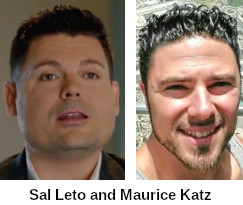How OneCoin was illegally promoted in the US
 On paper OneCoin never officially operated in the US. Unofficially US investors were being fed the same lies and encouraged to sign up.
On paper OneCoin never officially operated in the US. Unofficially US investors were being fed the same lies and encouraged to sign up.
Spearheading these efforts were Maurice Katz and Sal Leto. Katz and Leto hosted various OneCoin events across the US, with the assistance of local promoters.
One such event was attended by William Horn.
Horn (76) is from Tennessee. He first learned of OneCoin in 2015 following repeat encounters with James West at a local electronics store.
 West (right) pitched Horn on OneCoin, using the infamous “bitcoin killer” spiel.
West (right) pitched Horn on OneCoin, using the infamous “bitcoin killer” spiel.
Although he agrees he was ‘not looking to invest in any cryptocurrency’, Horn states, at the time, he was ‘closely attuned to what was happening with’ bitcoin.
Horn claims he didn’t want to invest anything initially, but to get rid of West gave West $500 to invest on his behalf.
A: It’s an expensive way to get somebody to stop seeking you out.
Q. But unfortunately he didn’t take the hint, correct?
A. No. He didn’t take the hint. He was persistent. He was a better salesman than I. He sold me on the end.
West took the cash and signed Horn up with a OneCoin Starter Package.
The same year West was recruited, OneCoin began promoting a USA launch.
The first launch event happened in July 2015. Although attended by a few hundred investors, as far as launching OneCoin in the US went the event flopped.
A few months later OneCoin announced it was opening a US bank. Finally in October 2015, OneCoin announced it was officially pulling out of the US.
Nautrally, that was a lie.
 In January 2016 Maurice Katz and Sal Leto held a OneCoin event in Nashville.
In January 2016 Maurice Katz and Sal Leto held a OneCoin event in Nashville.
Q. How many people approximately attended that event?
A. Approximately 300.
Q. And could you briefly summarize some of the things that the speakers at that event said about OneCoin?
A. They said that the bottomline if you put money into this it’s going to grow like wild fire, make a lot of money off of it.
In April Katz and Leto held another event Horn attended, this time in Houston, Texas.
West hired a bus to attend the Texas event. All up he put up around $5000 to pay the way for other investors to attend.
Horn also attended regular local events in Tennessee. These events were organized by James West.
At the events, attendees were instructed to
lose your cellphone. Do not bring the cellphone. If you’re caught using your cellphone in that meeting hall we’ll take it.
You could not record audio or video at these meetings.
The reason for the secrecy is because Katz and Leto were promoting OneCoin across the US illegally.
Q. Did anyone tell you why?
A. They had not been accepted through the SEC, Securities and Exchange Commission, in North America.
Q. Meaning you had an understanding of OneCoin was not authorized by the SEC in the United States?
A. They were viewed as selling unsecured securities, unregistered.
In addition to Katz, Leto and West, Horn identifies Bob Byrum as being “at the top of the (OneCoin) food chain”.
In an attempt to avoid triggering an SEC investigation, US OneCoin investors were instructed to lie about their residence.
Q. When you registered with OneCoin what were you told to say regarding where you lived?
A. We were told in addition to your regular address you were a resident of U.S. Virgin Islands.
Q. Did anyone say why you should report that you were a resident of the U.S. Virgin Islands?
A. That was because they were not registered in the United States as a legitimate concern.
Once signed up with bogus details, US OneCoin investors then wired funds to a German bank account in the name of IMS GmbH.
IMS is owned by Frank Ricketts and was part of OneCoin’s money laundering network.
IMS wasn’t the only shell company OneCoin used. A later $6062 Tycoon Package investment was sent to Secure Point Corporation of Lynbrook, New York.
So as not to raise suspicion, OneCoin investors were instructed to lie about the purpose of the transfers.
Q. Do you remember what you told the bank about the reason for this wire transfer, your own bank?
A. It was for educational purposes, educational documents and training.
Q. And why did you tell the bank that that was the purpose of the wire?
A. Well, number one, we were told that the wire would probably not take place if the true nature of the money being spent was said to the bank.
Documents in OneCoin’s backoffice explicitly stated:
Do not include words like OneCoin investment, digital currency or cryptocurrency.
Using these words or similar will cause your bank wire to be rejected and funds will be returned.
Following these instructions, Horn transferred $20,570 to IMS’ account in Heiligenhaus, Germany.
The money was transferred in Horn’s granddaughter’s name. Horn claims the intent was to create “a little savings account for her education later.”
Horn pawned a gold chain and sold Dodge truck and generator to fund his OneCoin investment. In total he invested “close to $30,000”.
In addition to his own OneCoin account and that of his granddaughter, Horn also convinced two younger brothers and a sister to sign up.
Horn claims he began to suspect OneCoin was fraudulent around May 2016.
Q. And what caused you to come to that conclusion?
A. Nothing in my years I’ve been on this earth that anybody was going to make those fictitious gains with a little bit of money.
They were giving away so much that it couldn’t be true. It was a fraud. And I determined that.
In late 2016 Horn would eventually report his concerns to the FBI. OneCoin’s token withdrawals collapsed in January 2017.
Q. Mr. Horn what happened to the money that you invested in OneCoin?
A. Well it’s gone. It’s not to be had.
Q. Have you ever gotten a penny of it back?
A. No.
Q. How about your family that invested? Did they get any of it back?
A. Nothing. They were the ones that could ill afford to lose the money.
Q. How has the loss of the money affected you and your family financially?
A. Well somewhat like other people they were afraid — were afraid, ashamed to admit that we were duped into investing money and some people do it, just never tell anybody that they spent thousands.
Age 73 at the time, Horn claims OneCoin losses left him having to work “longer (and) harder”.
After OneCoin, Maurice Katz and Sal Leto began promoting iPro Network. The SEC sued iPro Network for fraud in May last year.
After iPro Network Leto hitched his name to Eaconomy. Eaconomy collapsed less than a week ago.
Leto is now Chief Networking Officer of Auvoria Prime, a forex trading bot scheme. Maurice Katz appears to be laying low.
James West is currently promoting CorVive. I wasn’t able to find any information on Bob Byrum.
To date the SEC has taken no action against OneCoin or any of its promoters in the US.


Damn!!! Scams r us!
Well, honestly speaking, those idiots at onecoin should be more carefull.
They might just have a run in with someone that has nothing lose and has no issues what so ever in putting a bullet in their spinal cords, knee caps and hands. 1 year from now, or 10.
Just piss off the correct person and their education is assured More so in Texas.
I found this post on Facebook. However all sites still appear to be down despite what it says. Has it ended?
Wasn’t Steve Gotberg one of the three Amigo’s with Maurice Katz and Sal Leto?
Let’s not forget Denis Murdock and his being the first franchisee of DealShaker in the USA and who helped get Konstantin to visit the USA. I’ll never forget him claiming that OneCoin was bigger than Apple.
HELLO all. Where can I report to claim my lost money? Is it possible?
I have lost money in this scam and my Daughter had lost total up to £8000 pounds.
please help if possible. Thank you.
@Hari
No. Sorry for your loss.
Good article, but two errors: 1) The photo is not that of James West. Don’t know who that person is, but it isn’t Mr. West.
2) It’s Bob Byrum, not Byron. Last I heard he was living in Trenton GA, near Chattanooga. He can be found to this day on YouTube hawking some sort of miracle cure or some such. youtube.com/watch?v=o3q2O5KKI40
(Ozedit: derail removed)
As far as I was able to tell when putting this article together that’s OneCoin’s James West. If you have any information that shows otherwise I’m all ears.
Byrum seems to be a misspelling. Not sure if that was me or the court filing. I’ve fixed the error, thanks.
It’s Byrum, not Byrun — still needs correction. That will aid in your research.
The most obnoxious thing about Byrum is that he is fond of hawking his Christian faith to his audience, and he did that long after he had to know OC was a scam (hypocrite!).
I met Mr West some years back at Electronic Express, where he used to be a salesman, and that goofy-looking guy is most definitely someone else.
James West is in his 70s by now. Great article, however!
Fair enough. Out of an abundance of caution I’ll remove the accompanying West photo.
If everyone involved in onecoin in the US could please contact me at (removed) or (removed) I would appreciate it.
I’m the one who has initiated the class action… look forward to hearing from you.
I have to ask why you didn’t include Glenn Smith, Sal Leto and Maurice Katz in your class action lawsuit? Three of the biggest pimps and leaders of OC in the US.
Leaving those contact details up for 48 hrs (existing verified lawsuit, not fishing).
Oz wrote:
That is correct, but we should not forget what was announced on the onecoin.eu scam portal:
Note: Of course, Pehr Karlsson is meant. The OneCoin scammers in Sofia have often misspelled the names of their so-called “leaders”.
share-your-photo.com/32f8da96fc
Following this announcement, OneCoin scam events were held in the United States in the following locations:
share-your-photo.com/d4f737d724
The AURUM GOLD COIN lie was also spread in the United States.
share-your-photo.com/909bb1cfb8
Already in June 2015 this video with the serial cheater Tom McMurrain was presented on YouTube:
share-your-photo.com/c8086d2ad7
OneCoin scammer Nhoun Sopheak has spread this lie – among other things:
share-your-photo.com/41781a2a14
“On paper, never operated in the US” is the excuse scammers give themselves, and is the way LE clamps them.
You don’t have to be in the jurisdiction in any corporate entity capacity to qualify to be operating in the US. You transact/do business with one US person, you are operating in the US.
What was truly funny about the list of cities where OC was going to give presentations by the US team, they listed Los Angeles.
But instead of holding this event in Los Angeles, it was held in that mega financial center Whittier, CA about 10 miles south of LA.
They also held an event in Orange County, CA for the deaf community. NO I am not kidding.
On February 26, 2016, the greasy Ted Nuyten wrote on BFH:
share-your-photo.com/6ec6c0fbc5
share-your-photo.com/d771135c65